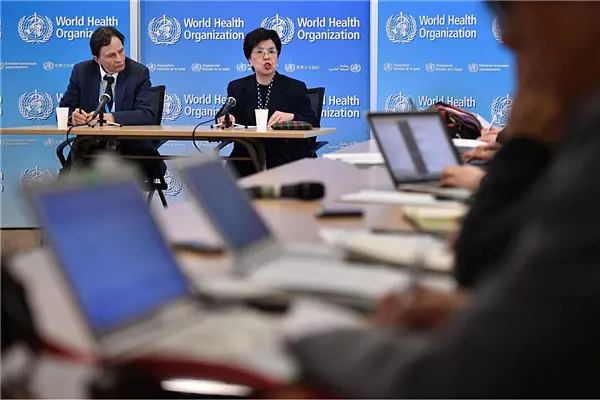Dr. Margaret Chan, the director general of the W.H.O, and Dr. David L. Heymann at a news conference on Tuesday in Geneva after a meeting about the Zika virus.CreditFabrice Coffrini/Agence France-Presse — Getty Images
(THE NEW YORK TIMES) TheWorld Health Organizationadvised pregnant women on Tuesday to avoid travel to areas where the Zika virus is spreading.
Experts on the organization’s Zika emergency committee also recommended that pregnant women and their partners who have been in areas with Zika rely on abstinence or safe sex to prevent sexual transmission of the virus.
Sexual transmission is “more common than previously assumed,” said Dr. Margaret Chan, the agency’s director general.
Local transmission of the virus has now been reported in 31 countries or territories in Latin American and the Caribbean. The agency emphasized that it was not recommending that women avoid whole countries, but only “areas” where mosquitoes were transmitting the virus.
“The onus is on countries to report where they are having outbreaks,” said Dr. David L. Heymann, the chairman of the emergency committee, who is a professor of infectious disease epidemiology at the London School of Hygiene and Tropical Medicine. “Then it’s up to the pregnant women to decide whether they want to travel there.”
The committee also called for more research on the virus and better surveillance to track its spread.
The panel suggested that countries intensively control mosquitoes near airports and consider sprayinginsecticideinside planes before takeoff, a common anti-malariameasure.
The committee stopped short of advising women to delaypregnancyif they live in areas in which the virus is circulating, but Dr. Chan said women who chose to do so should be given access tocontraception.
Asked why the committee had not advised women to delay pregnancies, Dr. Heymann said he considered that a “national recommendation” rather than one under the W.H.O.’s mandate, which is to prevent the international spread of diseases.
The virus has been linked tomicrocephaly— tiny heads and brain damage — in infants born to infected women.
Someexperts argue that persuading women to postpone pregnancyis the best way to prevent a wave of suchbirth defects, because mosquito control is usually ineffective, a vaccine is months off and previous Zika outbreaks rapidly peaked and fell.
Travel advisories andbirth controlare sensitive topics for the W.H.O. because it is a United Nations organization, and its member states sometimes object to medical advice they feel interferes with tourism, business or domestic policies.
This is the first time the W.H.O. has advised that pregnant women avoid travel. Previously, the W.H.O. had advised women only to “consider delaying travel.”
TheCenters for Disease Control and Preventionissued similar warnings weeks ago. On Jan. 15, theC.D.C. advised pregnant American women to consider avoiding travelto any countries or territories where the Zika virus was being transmitted.
That advice upset officials in countries with low-risk areas. For example, although Mexico is on the list, Mexico City is at a high altitude and mosquito-borne diseases are not a threat.
Aline da Silva Ferreira, 15, and her 4-month-old, Luís Guilherme, who was born with microcephaly, in Vertentes, Brazil, last week.CreditMauricio Lima for The New York Times
On Feb. 4, the C.D.C.advised pregnant women to avoid unprotected sexwith men who had been in areas where the Zika virus was spreading.
The United States, Italy and France have all reported cases of suspected sexual transmission.
Now, Dr. Chan said, the infection has also been linked to fetal death, slow fetal growth and injury to nerves in the developing brain, as well as to a temporaryparalysisin children and adults called Guillain-Barré syndrome.
“We can conclude that the virus is neurotropic,” she said, meaning it targets nerve and brain cells.
Nine countries have reported either increases in cases of Guillain-Barré syndrome during Zika outbreaks or cases in which the virus was found in Guillain-Barré victims. The syndrome is caused by an autoimmune attack on the nervous system, often following a viral or bacterial infection.
Cases ofmicrocephalyfollowing outbreaks of Zika virus have been reported only in Brazil and French Polynesia.
But “it’s a timeline becausepregnancyis nine months long,” Dr. Heymann said. “What we see in Brazil now is what we could see in Colombia and other countries in the next few months, and it’s very alarming.”
The W.H.O.declared a public health emergencyon Feb. 1 and asked donors to give $56 million toward the response. Dr. Chan said the agency had received only $3 million. “We encourage countries to support this very important work,” she said.
Since the emergency declaration, Dr. Heymann said, the W.H.O. has reacted rapidly, issuing 10 sets of guidelines to countries on how to handle Zika virus outbreaks.
He said evidence continued to mount that the virus, and nothing else, was to blame for increases inbirth defectsand Guillain-Barré in affected countries.
The advisory committee said particular attention needed to be given to several research areas: studies comparing infected and uninfected pregnant women; genetic sequencing of viral strains; how often the infection causes symptoms; and whether asymptomatic infections are dangerous.
 简体中文
简体中文

